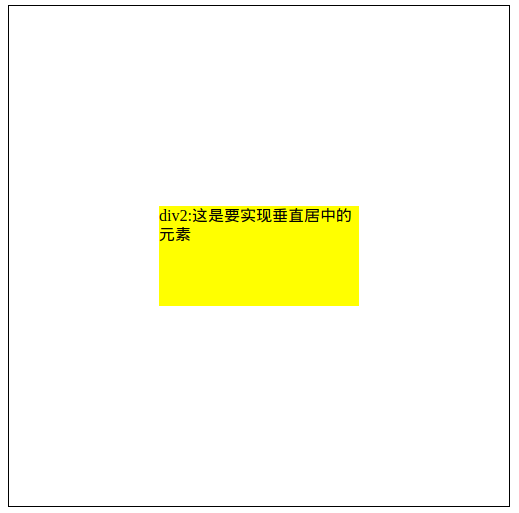1. 实现div的水平居中和垂直居中
实现效果:

这大概是最经典的一个题目了,所以放在第一个. 方法有好多, 一一列来
主要思路其实就是
- 使用position,相对父元素做绝对定位(设置百分比[由父元素宽高调节子元素大小]/设置margin和相对位置(确定宽高))
- 使用flex属性
- 使用tranfrom做相对位移的调节
1) 只适用: 宽高已定
设置position: absolute(父元素记得设置: relative), 然后top和left设置50%, 50%, 再设置margin-left=宽/2, margin-top:宽/2
.div1{ width:500px; height:500px; border:1px solid black; position: relative; /*很重要,不能忘*/ } .div2{ background: yellow; width:300px; height:200px; margin-left:-150px; margin-top:-100px; top:50%; left:50%; position: absolute;
2) 只适用: 固定宽高; 如果宽高随意,想靠内部撑开的话, 会占满整个父div
依然是利用position:子div的上下左右都设置成0,然后margin设置auto。关键是要设置position:子absolute,父relative。
.div1{ width:500px; height:500px; border:1px solid black; position: relative; /*很重要,不能忘*/ } .div2{ background: yellow; width:300px; height:200px; margin:auto; bottom: 0; top:0; left:0; right:0; position: absolute;
3) 适用: 不论是否固定宽高都可用. 问题在于兼容性. ie9及以下不支持
设置父级flex属性: display:flex; justify-content:center; align-items: center;
这种方法在子级div有多个时也可以实现居中----具体看flex属性设置
.div1{ width:500px; height:500px; border:1px solid black; display: flex; justify-content: center; /*使垂直居中*/ align-items:center; /*使水平居中*/ } .div2{ background: yellow; /*300px; height:200px;*/ }
4) 适用: 要设宽度, 否则会使得宽度为父级div的宽度
父级元素设置display:table-cell ,然后vertical-align:middle。这种方法可以设置垂直居中. 这时候只要在子元素里设置margin:auto即可实现水平居中
但是这种方法好像会使父元素的居中无效。
.div1{ width:500px; height:500px; border:1px solid black; display:table-cell; vertical-align: middle; } .div2{ background: yellow; width:300px; /*height:200px;*/ margin:auto; }
5) 适用: 可不指定宽高
使用transform居中. 设置父级position:relative; 子级position:absolute. 然后top: 50%; left:50%; transform:translate(-50%,-50%)
.div1{ width:500px; height:500px; border:1px solid black; position: relative; } .div2{ background: yellow; position: absolute; /*200px;*/ top:50%; left:50%; transform:translate(-50%,-50%); }
6) 适用: 指定宽高百分比
保证left和right的百分数一样就可以实现水平居中,保证top和bottom的百分数一样就可以实现垂直居中。但是这种方法不能由内部元素自动调节div的宽高,而是通过父元素大小控制的
.div1{ width:500px; height:500px; border:1px solid black; position: relative; } .div2{ background: yellow; position: absolute; left: 30%; right: 30%; top:40%; bottom: 40%; }
7) 使用display:inline-block加伪元素
.div1{ width:600px; height:200px; border:1px solid black; text-align: center; } .div1:after{ content:""; display: inline-block; vertical-align: middle; height: 100%; } .div2{ background: black; color:white; display: inline-block; }
box 容器通过 after或者before 生成一个高度 100% 的「备胎」,他的高度和容器的高度是一致的,相对于「备胎」垂直居中,在视觉上表现出来也就是相对于容器垂直居中了
2. 多元素水平居中
效果:

1) 把子级div设置成display:inline-block; 然后父级div设置text-align:center;
/**base style**/ div{ background:#000; color:#fff; height:50px; width:50px; text-align:center; line-height:50px; margin-left:10px; } /**start here**/ main{ text-align:center; } div{ display:inline-block; *display:inline;/*hack IE*/ *zoom:1;/*hack IE*/ }
2) 更方便灵活的做法还是使用flex-box, 设置水平居中 justify-content: center
main{ display:flex; justify-content:center; }
3. 实现栅格化布局

使用flex,
.parent{ display: flex; flex-direction: column; /*按列的顺序*/ flex-wrap: wrap; /*可换行*/ height: 440px; width: 660px; }
参考: CSS常见布局问题整理